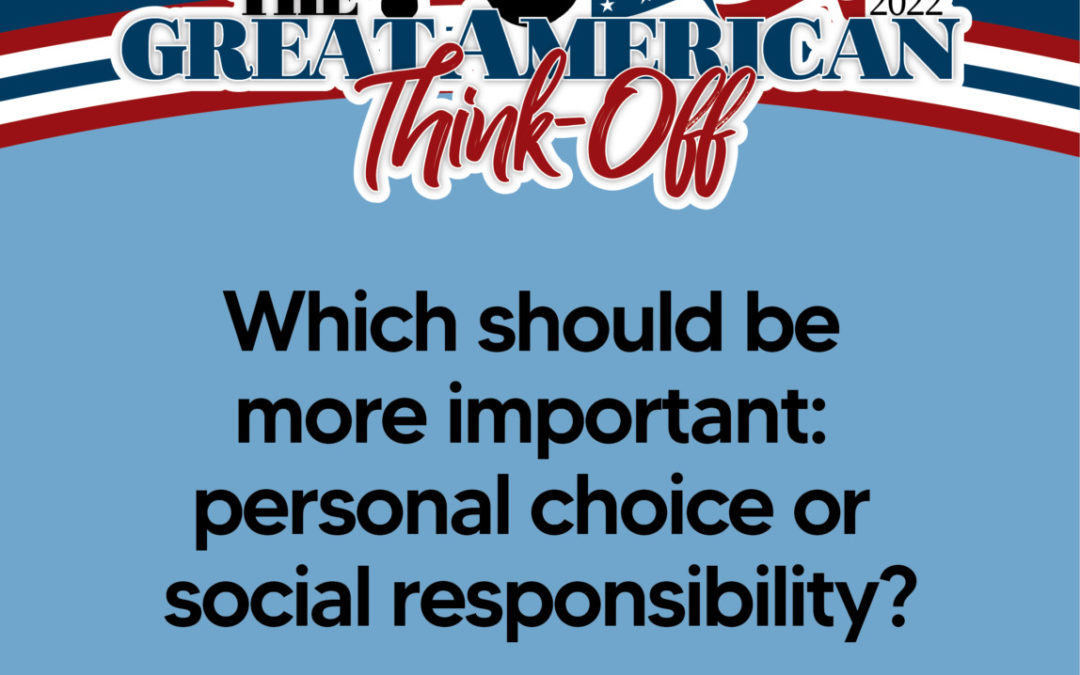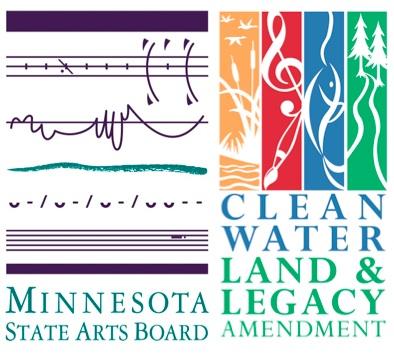America’s Greatest Thinker: Blaine Rada
Audience Votes: Social Responsibility is More Important than Personal Choice
On Saturday, June 11, 2022, a majority of the audience of more than 200 voted to name Blaine Rada of Darien, IL America’s Greatest Thinker for 2022. Rada successfully argued that social responsibility is more important than personal choice, defeating Dennis Nau of Fergus Falls, MN, who was arguing on the side of personal choice.
In the first two rounds of debate, Matt Anderson of Sunnyvale, CA, argued on the side of social responsibility, and Ron Stewart of Coon Rapids, MN, argued on the side of personal choice.

2022 Think-Off Finalists (L-R): Matt Anderson (bronze medalist), Dennis Nau (silver medalist), Blaine Rada (gold medalist), and Ron Stewart (bronze medalist).
 Think-Off champion Blaine Rada is an accomplished training professional with over 30 years of experience in the mortgage industry; his focus is on helping organizations rise above the competition. As a member of the National Speakers Association, Blaine has achieved its highest earned designation, the Certified Speaking Professional (CSP).
Think-Off champion Blaine Rada is an accomplished training professional with over 30 years of experience in the mortgage industry; his focus is on helping organizations rise above the competition. As a member of the National Speakers Association, Blaine has achieved its highest earned designation, the Certified Speaking Professional (CSP).
If Blaine’s name seems familiar, it is because as he was also a Think-Off winner in 2005, when he successfully argued that that cooperation benefits society more than competition. Interestingly, Blaine quoted John F. Kennedy in both his 2005 and 2022 closing statements. In 2005, he shared JFK’s quote: “United there is nothing we can’t do, divided there is nothing we can.” Keep reading for the 2022 quote below!
The 2022 Great American Think-Off debate began with this sentiment:
“Our hope is that you’ll see that we can disagree without being disagreeable.” — Moderator Jennifer Nelson
Jennifer eloquently described civil disagreement, which is the main value that the Great American Think-Off was founded on and continues to support today, 29 years later.
Round 1
Personal Choice
Dennis Nau vs. Ron Stewart
In the first round, Nau shared the stage with Ron Stewart of Coon Rapids, MN, with each arguing their personal points of view on their common stance that personal choice should be more important than social responsibility.
Stewart led with the argument that cultures who enable greater personal choice tend to have better outcomes.
He stated, “There are 3 reasons why individual liberty must be central for even social-oriented cultures to thrive: one, the lack of liberty leads to a lack of initiative; two, liberty motivates innovation; and three, liberty protects integrity. Initiative, innovation, and integrity seem to be byproducts of liberty and allow for thriving at a personal level.”
He also argued that personal choice allows people to be more forward thinking, and that social responsibility can sometimes be defined by the wrong people or set of morals.
“Personal choice, in my experience, is more important because it not only allows the individual to strive but because it allows for society as a whole to benefit.”
— Finalist Ron Stewart
Nau based his argument on the idea that personal choice shapes progress in social responsibility. He argued that social responsibility for one segment may be different from another, and that “what seems to be socially responsible at a certain time may not seem like that later,” thus making it difficult to agree on what is truly socially responsible. Instead, he posited that personal choice leads to social responsibility.
Nau went on to say that “History is filled with examples of individuals who differed from what was considered the common good,” and he argued that the courage these individuals showed helped to shape what we now consider basic tenets of social responsibility.
“Social responsibility does not always align with what is morally right.” — Finalist Dennis Nau
The Cub Scouts collected ballots and a majority of the audience voted for Nau to advance to the final round.
Round 2
Social Responsibility
Matt Anderson vs. Blaine Rada
 In the second round, Rada debated Matt Anderson of Sunnyvale, CA, each presenting their unique arguments to support their shared position that social responsibility should be more important than personal choice.
In the second round, Rada debated Matt Anderson of Sunnyvale, CA, each presenting their unique arguments to support their shared position that social responsibility should be more important than personal choice.
Anderson led with the position that social responsibility is more critical than ever as we confront the great challenges before us, including topics like climate change, gun safety, and equity.
He argued that in a healthy democracy, people elect leaders who decide on policies that ensure social responsibility for the common good. He posited that we are at our best when serving others, and suggested that personal choice, at its worst, could lead to anarchy.
“We aren’t great because of our rights, but because of what we do with those rights.” — FInalist Matt Anderson
In the second round, Rada based his argument on the idea that our personal choices depend on a foundation of social responsibility. He stated, “Most of us are a combination of ‘me’ and ‘we.’ So how do we reconcile this tension within ourselves to ‘do the right thing’ when we also want to be free to do whatever we want?”
He continued that people don’t like being told what to do, so instead, helping people feel the desire to be more socially responsible is more effective than mandating it.
“Our words matter. . . . The lessons children learn at home and at school often reflect our highest ideals and wishes for them. Even our Pledge of Allegiance begins with ‘I’ but ends with ‘all.’ That’s a lesson worth learning.” — Finalist Blaine Rada
The audience placed their votes, collected by local Cub Scouts, and Rada prevailed over Anderson to advance to the final round.

The New York Mills Cub Scouts collected ballots once again at this year’s Great American Think-Off.
After a brief intermission to count ballots, moderator Jennifer Nelson invited finalists Dennis Nau & Blaine Rada back to the stage for the final round.

Final Round
Dennis Nau | Personal Choice vs. Blaine Rada | Social Responsibility

Nau began his defense of personal choice with the clarification that his stance assumes that people are reasonable, intelligent, and intend to do good. He argued that if a personal choice is powerful enough, then it can become the accepted social responsibility for all.
He continued with the concept that everyone believes that they are the socially responsible ones, that they are the ones acting in the best interest of society, so who judges? Who can decide between the two competing sides both convinced they’re right and identify what is truly socially responsible?
In his closing statement, Nau said, “Social responsibility is important, and I wish there was more of it in the world.” He went on to share that rarely, if ever, is there a clear, agreed-upon view of what the socially responsible action is.
Thus it comes down to personal choice, personal judgments—and we need to assume that the people around us are intelligent and have a basic sense of right and wrong.

Rada defended social responsibility in the final round with the stance we must be responsible to each other above ourselves. He said that personal choice is often self-driven and self-focused, and that the greatest, longest-lasting benefits come through social responsibility.
He also pointed out that facts do not sway people’s opinions. Instead, he argued, “The cure for most ills is to be better listeners—to sincerely try to understand someone’s point of view. In other words, conversation.”
In his closing statement, Rada shared that when he looks at thriving marriages, thriving communities, thriving countries, trust characterizes them all. But right now in America, we have a trust problem. Seeing the world as “us” vs. “them” is at the root of most of our social and institutional problems.
He shared a quote from JFK: “Ask not what your country can do for you; ask what you can do for your country.” He encouraged the audience to do just that by asking what our social responsibility is for each other.

Attendees agreed it was truly a great debate, with audience members struggling to select the winner in all three rounds. In the end, Rada defeated Nau, garnering more votes and thus earning the title of “America’s Greatest Thinker” for 2022, successfully arguing that social responsibility should be more important than personal choice.

Moderator Jennifer Nelson; Finalists Matt Anderson (bronze), Blaine Rada (gold), Dennis Nau (silver), and Ron Stewart (bronze); Executive Director Betsy Roder
2023 will be the 30th annual Think-Off Debate! We are already beginning plans to celebrate three decades of civil debate. Have suggestions or ideas, or just want to be part of the fun? Email info@kulcher.org or give us a call at 218-385-3339.
Interested in getting involved? Here are the DATES TO KNOW!
- January 1: Question Revealed
- April 1: Essays Due
- May 1: Finalists Announced
- Second Saturday in June (June 10, 2023): The Great Debate
We got a lot of great feedback from attendees that we will use to make next year’s event even better. Do you have more feedback to share? Click below!
Great American Think-Off Survey 2022 >
Did you miss the live debate? Watch the recording here: 2022 Think-Off Livestream
Learn more about the Think-Off here: About the Think-Off
See the history of the past 29 years of questions here: Think-Off History
We will also be publishing written versions of the Finalist and Honorable Mention essays soon. Thanks for your interest and we hope to see you again next year!




